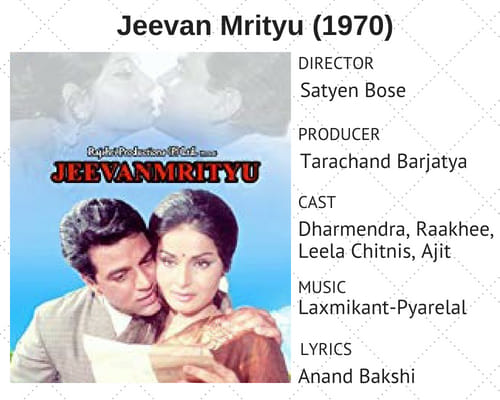Jeevan Mrityu serves as a standard for cinema that strives to point out the disease of dishonesty.
Four years after the UPA government was toppled over charges of multiple scams, the Indian Parliament is once again discussing the possibility of another scam with the opposition rallying against the NDA government. The Lok Sabha passed the Prevention of Corruption (Amendment) Bill in July which provides relief to bureaucrats but the debate about corruption rages on.
In this political trade of allegations, proven or otherwise, individual reputation and credibility become the first casualty. It brings to mind Satyen Bose’s 1970 revenge drama Jeevan Mrityu, which released to tremendous success.
Also read: Prevention of corruption law amended to protect bankers & former bureaucrats
 The story was about a bank manager who is falsely implicated in a case of embezzlement and sent to jail for seven years. A remake of the 1967 Uttam Kumar-starrer Bengali film, the title was a twin play on its philosophy as well as the plot.
The story was about a bank manager who is falsely implicated in a case of embezzlement and sent to jail for seven years. A remake of the 1967 Uttam Kumar-starrer Bengali film, the title was a twin play on its philosophy as well as the plot.
Dharmendra as the protagonist, Ashok Tandon, makes a revealing remark about his own as well as the film’s philosophy:
“Saat saal jail ki andheri raaton mein, main bhi yahi jaanne ki koshish karta raha ke iske alawa mera aur bhi koi parichay hoga ya nahi. Kahan main ye manta tha ki izzat ke bagair insaan ka jeevan mrityu samaan hai, kahan aaj main apni izzat hi kho baitha.
(I’d wonder through nights in the jail, trying to figure out if I’ll ever have any other identity but that of a fraudster. I used to believe that life was as good as death without respect. But here I am today, with my own dignity lost.)”
This belief that respect, honesty and dignity are paramount forms the crux of this anti-corruption themed film.
With the opening credit sequence itself, Bose establishes the film’s sombre, if heightened, tone by showcasing his protagonist in jail. Through a flashback, it is then revealed that he was an honest and hard-working employee of Citizen Bank, with a caring family and a love interest, but was framed by his colleagues Harish (Ajit), Jagat Narayan (Kanhaiyalal), Barrister P. Amarnath (Ramesh Deo) and Ramakant (Krishan Dhawan) for stealing Rs 10 lakh.
When he gets out, he finds a benefactor in Raja Ranvir Singh (Bipin Gupta) and plots revenge against his colleague. After Ashok is mistakenly reported to be dead, he takes on a new identity and sets off to get his former colleagues. The remainder of the film plays a bit like a thriller. In the end, he manages to not only find his old love back, Deepa (Raakhee), but also acquit himself of the corruption charges.
Also read: As we celebrate Kargil victory, ‘Hindustan Ki Kasam’ reminds us not to caricature Pakistan
Bose, the director of hits such as Jagriti (1954) and Chalti Ka Naam Gaadi (1958), found a most unlikely home for Jeevan Mrityu in Rajshri Productions, a banner known for clean family dramas. Bose had earlier made Dosti (1964) for Tarachand Barjatya’s banner.
And just like Dosti, Bose managed to create memorable music for this film with composers Laxmikant-Pyarelal. The mainstay of the film, and a big contributor to its success, was the song ‘Jhilmil sitaron ka aangan hoga’. Sung by Lata Mangeshkar and Mohd Rafi, it was an important highlight in the early, formative years of both the music composers and lyricist Anand Bakshi.
Jeevan Mrityu featured actor Dharmendra in yet another crusader role after 1969’s Satyakam, both sincere and genial performances. It also served as the debut of actor Raakhee in Hindi films who went on to do some good work in the ‘70s before taking on the ‘mother roles’ in ‘90s.
Also read: Try watching ‘Satyakam’ in the age of post-truth, fake news and incorruptible leaders
Based on a story by Vishwanath Rai, the film had overarching similarities to the plot of the French novel The Count of Monte Cristo.
The emotional connect of the film was so strong that it informed other similarly-themed films about wrongly-implicated heroes too, including Adalat (1976), Duniy
In a country as vast and diverse as India with possibilities of graft all around, anti-corruption films will never be out of vogue. Bose’s genuinely felt and modestly made, Jeevan Mrityu will continue to serve as a standard for a cinema that strives to point out the disease of dishonesty.
Also read: Haqeeqat’s grand battle sequences on 1962 India-China war are unmatched in cinema history






